Chuck Trudeau into the Great Pit of Carkoon and let Sarlacc deal with his bullshit.I'm sorry - i know this is a serious issue but i look at that picture and all i can think is that R2D2 is about to get shot and sold as a slave to work on moisture vaporators.
Public Inquiries into Emergencies Act begin September 19
- Thread starter The_Foxer
- Start date
You are using an out of date browser. It may not display this or other websites correctly.
You should upgrade or use an alternative browser.
You should upgrade or use an alternative browser.
“Holy Tiananmen Square BatPeoples!”Jezuz christ!! What the hell is wrong with these people? Tanks?!?! Can you believe that the declaration of the Emergency Act was actually the MIDDLE OF THE ROAD response for these people?!?!
Only days after Freedom Convoy first set up shop in the Ottawa core, federal ministers were casually discussing whether they should order the demonstration to be crushed with tanks.
The exchange was revealed in text messages tabled before the Emergencies Act inquiry. On Feb. 2 – just five days after anti-mandate protesters set up blockades in the national capital — Justice Minister David Lametti sent a text to Public Safety Minister Marco Mendicino urging him to call in the Canadian Armed Forces.
“You need to get the police to move. And the CAF if necessary. Too many people are being seriously adversely impacted by what is an occupation,” Lametti texted to Mendicino.
“How many tanks are you asking for. I just wanna ask (Defence Minister) Anita (Anand) how many we’ve got on hand,” was the reply.
To which Lametti wrote back “I reckon one will do!!”
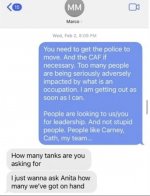
FIRST READING: Trudeau cabinet casually discussed crushing Freedom Convoy with tanks — National Post
Justice Minister David Lametti claimed it was a joke, although he may not have been joking about suggesting they call in the army
Justice Minister inquired about using Emergencies Act just two days into Freedom Convoy protest — National Post
Text messages at the Emergenices Act inquiry reveal Lametti also asked if Canadian Armed Forces would be available to move in on protesters
Rex Murphy: Should Justin Trudeau be deciding what views are 'acceptable'? — National Post
The prime minister's scornful dismissal of the truckers convoy makes me wonder: have those who rule us forgotten the basis of their rule?
Anyway, today is Thursday & the second to last day of Testimony at the Emergencies Act Inquiry. Canada’s deputy prime minister and finance minister will appear at the Emergencies Act inquiry today, the latest senior official to speak about why the federal government triggered the never-before-used law to deal with last winter’s “Freedom Convoy” protests.
Chrystia Freeland is slated to testify Thursday, along with top officials in the Prime Minister’s Office.
The latter group includes Katie Telford, Prime Minister Justin Trudeau’s long-serving chief of staff, and senior PMO staffers Brian Clow and John Brodhead.
As finance minister, Freeland will be called to explain the special powers created under the Emergencies Act that compelled financial institutions to freeze the assets and bank accounts of protest participants.
Top Justin Trudeau officials say Emergencies Act may need an overhaul — Toronto Star
Finance Minister Chrystia Freeland arrives to appear as a witness at the Public Order Emergency Commission in Ottawa, on Thursday, Nov 24, 2022.
Good thing they didn't deploy tanks. If Canadians had the brains and balls of Ukrainians, they woulda hauled the tanks away with tractors.
There were tractors present at that protest.Good thing they didn't deploy tanks. If Canadians had the brains and balls of Ukrainians, they woulda hauled the tanks away with tractors.
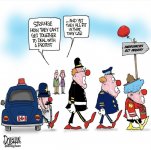
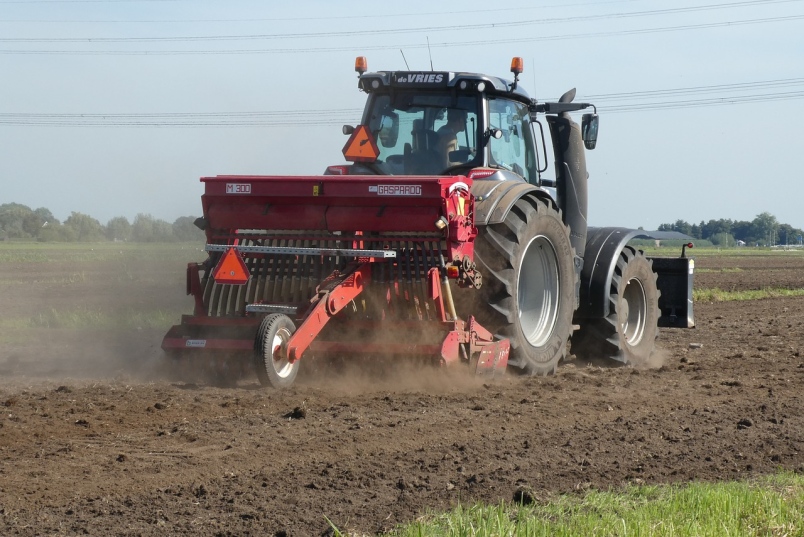
Farmers coming to Parliament Hill to support trucker convoy over weekend
A Facebook group was created to organize the event, which will see a tractor convoy coming from Alexandria.
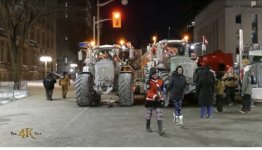
Especially out here in the prairies….There isnt a shortage of Canadian Ukrs.
GUNTER: Liberal elite have more faith in piety than rule of law — Toronto Sun
The attitude of Canada’s ruling Liberal elite, as demonstrated by testimony during the Rouleau inquiry, is basically: “The law is what we say it is. Being the most enlightened creatures in the history of the planet (by our own admission), what we say must be wiser than any law passed by...
Now here is where the we-know-better, we-are-above-the-law smugness of our “progressive” governors comes in. In his testimony on Monday, Vigneault said that despite the fact that no national security threat existed, he nonetheless recommended the Trudeau government use the Emergencies Act.
If the truckers weren’t allowed to ignore the law by continuing their protests in Ottawa, how did the government think it was okay for them to ignore the law when clearing out the protestors?
Vigneault added Monday that the definitions in the Emergencies Act are outdated because they don’t include “economic harm or environmental harm, even public health harm, and the pandemic.”
Maybe that’s true. Yet even if it is, the solution would be to change the law, not expand the law at the whim of the government or apply it however and whenever the government sees fit.
How much will the class action suit this triggers cost Canadians? Id sue the MPs and PM directly.
I don’t think you can. They are protected from this sort of thing directly.How much will the class action suit this triggers cost Canadians? Id sue the MPs and PM directly.
Not for an abuse of power.I don’t think you can. They are protected from this sort of thing directly.
I don’t know. Unfortunately, I don’t have the time at this point to dig further but I think it’s covered under parliamentary privilege…Not for an abuse of power.
It was personal and not for the benefit of Canadians as a whole. The line was crossed.
It also refers to the powers possessed by the House to protect itself, its members and its procedures from undue interference so that they can carry out effectively their principal functions which are to legislate, deliberate and hold the government to account.
Hold the government to account , yea right . Look at lap dog Jagmet .It was personal and not for the benefit of Canadians as a whole. The line was crossed.
Thursday…(11/24/22) second last day of testimony in the Emergencies Act Inquiry:
It’s Freeland’s turn to spin the wheel of truth. Very curious how that’ll pan out…
I’m assuming due to her multiple Hats (Deputy PM & Finance Minister & whatever else she is in & out of cabinet), she’s going to point at the blockades at Windsor and Coutts (that where both dissolved without the use of the Emergencies Act by the OPP & RCMP respectively)….& somehow tie that to freezing bank accounts for those involved, suspected of being involved, or donating to (even before the Emergencies Act was enacted on Feb 14th) this protest with its “unacceptable views” and such…?
Survey Says?!:
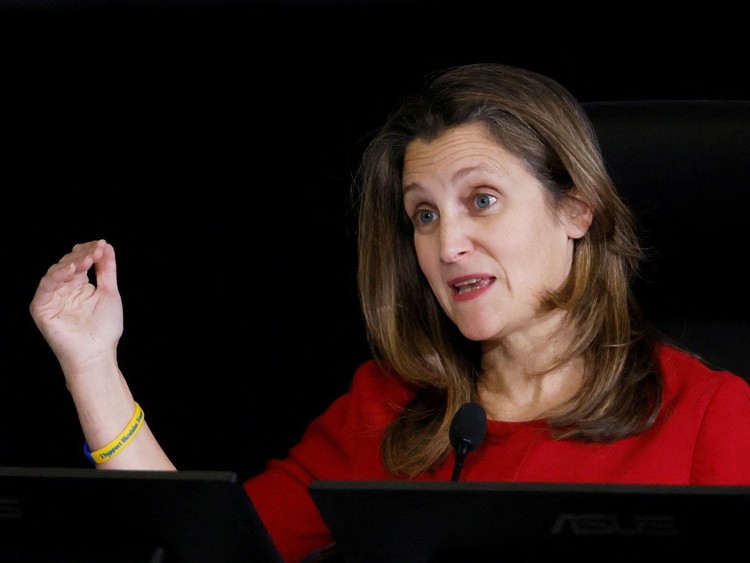
 apple.news
apple.news
Bing! Freeland testified on the second last day of Emergencies Act inquiry public hearings that a Feb. 10 call with Brian Deese, director of U.S. President Joe Biden’s national economic council, was a “seminal” moment.
She said Deese told her the U.S. was deeply worried that the Ambassador Bridge closure would lead to more auto plant closures. Freeland said getting Deese on the phone often takes weeks, but he called her back immediately during the blockades, which spoke to the American level of concern.
“That one conversation was a seminal one for me. And it was the moment when I realized as a country, somehow, we had to find a way to bring this to an end,” Freeland said.
She said a call between Biden and Prime Minister Justin Trudeau was set up within 24 hours of the call with Deese, which is something that usually takes weeks.
So…the USA decided to impose the Emergencies Act on Canadians that were protesting in Canada against the Canadian Government then?
She said the government had already been pushing back against U.S. measures to bring in tax incentives for electric vehicles (EVs) that would have destroyed the Canadian auto industry. Oh…so this was about the Ontario Auto Industry and the USA…for Justin-ification then…even though the borders were opened without the Emergencies Act then?
It’s Freeland’s turn to spin the wheel of truth. Very curious how that’ll pan out…
I’m assuming due to her multiple Hats (Deputy PM & Finance Minister & whatever else she is in & out of cabinet), she’s going to point at the blockades at Windsor and Coutts (that where both dissolved without the use of the Emergencies Act by the OPP & RCMP respectively)….& somehow tie that to freezing bank accounts for those involved, suspected of being involved, or donating to (even before the Emergencies Act was enacted on Feb 14th) this protest with its “unacceptable views” and such…?
Survey Says?!:
Canadian bank CEOs told Freeland that Freedom Convoy made Canada a 'joke' — National Post
Freeland was 'very worried' U.S. would use Freedom Convoy for ammunition on protectionist measures
Bing! Freeland testified on the second last day of Emergencies Act inquiry public hearings that a Feb. 10 call with Brian Deese, director of U.S. President Joe Biden’s national economic council, was a “seminal” moment.
She said Deese told her the U.S. was deeply worried that the Ambassador Bridge closure would lead to more auto plant closures. Freeland said getting Deese on the phone often takes weeks, but he called her back immediately during the blockades, which spoke to the American level of concern.
“That one conversation was a seminal one for me. And it was the moment when I realized as a country, somehow, we had to find a way to bring this to an end,” Freeland said.
She said a call between Biden and Prime Minister Justin Trudeau was set up within 24 hours of the call with Deese, which is something that usually takes weeks.
So…the USA decided to impose the Emergencies Act on Canadians that were protesting in Canada against the Canadian Government then?
She said the government had already been pushing back against U.S. measures to bring in tax incentives for electric vehicles (EVs) that would have destroyed the Canadian auto industry. Oh…so this was about the Ontario Auto Industry and the USA…for Justin-ification then…even though the borders were opened without the Emergencies Act then?
Says lots about Canada being ( at the ) back . Takes weeks for the deputy PM and finance minister to organize a call with one of President Biden‘s deputies or to set up a call between President and PM . Canada is back to being irrelevant.Thursday…(11/24/22) second last day of testimony in the Emergencies Act Inquiry:
It’s Freeland’s turn to spin the wheel of truth. Very curious how that’ll pan out…
I’m assuming due to her multiple Hats (Deputy PM & Finance Minister & whatever else she is in & out of cabinet), she’s going to point at the blockades at Windsor and Coutts (that where both dissolved without the use of the Emergencies Act by the OPP & RCMP respectively)….& somehow tie that to freezing bank accounts for those involved, suspected of being involved, or donating to (even before the Emergencies Act was enacted on Feb 14th) this protest with its “unacceptable views” and such…?
Survey Says?!:

Canadian bank CEOs told Freeland that Freedom Convoy made Canada a 'joke' — National Post
Freeland was 'very worried' U.S. would use Freedom Convoy for ammunition on protectionist measuresapple.news
Bing! Freeland testified on the second last day of Emergencies Act inquiry public hearings that a Feb. 10 call with Brian Deese, director of U.S. President Joe Biden’s national economic council, was a “seminal” moment.
She said Deese told her the U.S. was deeply worried that the Ambassador Bridge closure would lead to more auto plant closures. Freeland said getting Deese on the phone often takes weeks, but he called her back immediately during the blockades, which spoke to the American level of concern.
“That one conversation was a seminal one for me. And it was the moment when I realized as a country, somehow, we had to find a way to bring this to an end,” Freeland said.
She said a call between Biden and Prime Minister Justin Trudeau was set up within 24 hours of the call with Deese, which is something that usually takes weeks.
So…the USA decided to impose the Emergencies Act on Canadians that were protesting in Canada against the Canadian Government then?
She said the government had already been pushing back against U.S. measures to bring in tax incentives for electric vehicles (EVs) that would have destroyed the Canadian auto industry. Oh…so this was about the Ontario Auto Industry and the USA…for Justin-ification then…even though the borders were opened without the Emergencies Act then?
It reads like justification for the Emergencies Act was due to phone calls being accepted in a day instead of the normal weeks from US Politicians? It’s bizarre at best….Says lots about Canada being ( at the ) back . Takes weeks for the deputy PM and finance minister to organize a call with one of President Biden‘s deputies or to set up a call between President and PM . Canada is back to being irrelevant.
Says lots about Canada being ( at the ) back . Takes weeks for the deputy PM and finance minister to organize a call with one of President Biden‘s deputies or to set up a call between President and PM . Canada is back to being irrelevant.
It reads like justification for the Emergencies Act was due to phone calls being accepted in a day instead of the normal weeks from US Politicians? It’s bizarre at best….
Washington pressed Ottawa to shut down 'Freedom Convoy' blockades — POLITICO
Testimony reveals that Biden, Buttigieg and White House adviser Deese urged counterparts in Canada to resolve crisis.
So…the Canadian Federal Government ruling Liberal/NDP party, enacted the Emergencies Act suspending the Canadian Charter of Rights & Freedoms, Froze personal bank accounts, etc…because Joe Biden told them to? Somehow I don’t think this is what the Legislators & Authors of the Emergencies Act had in mind back in 1988.
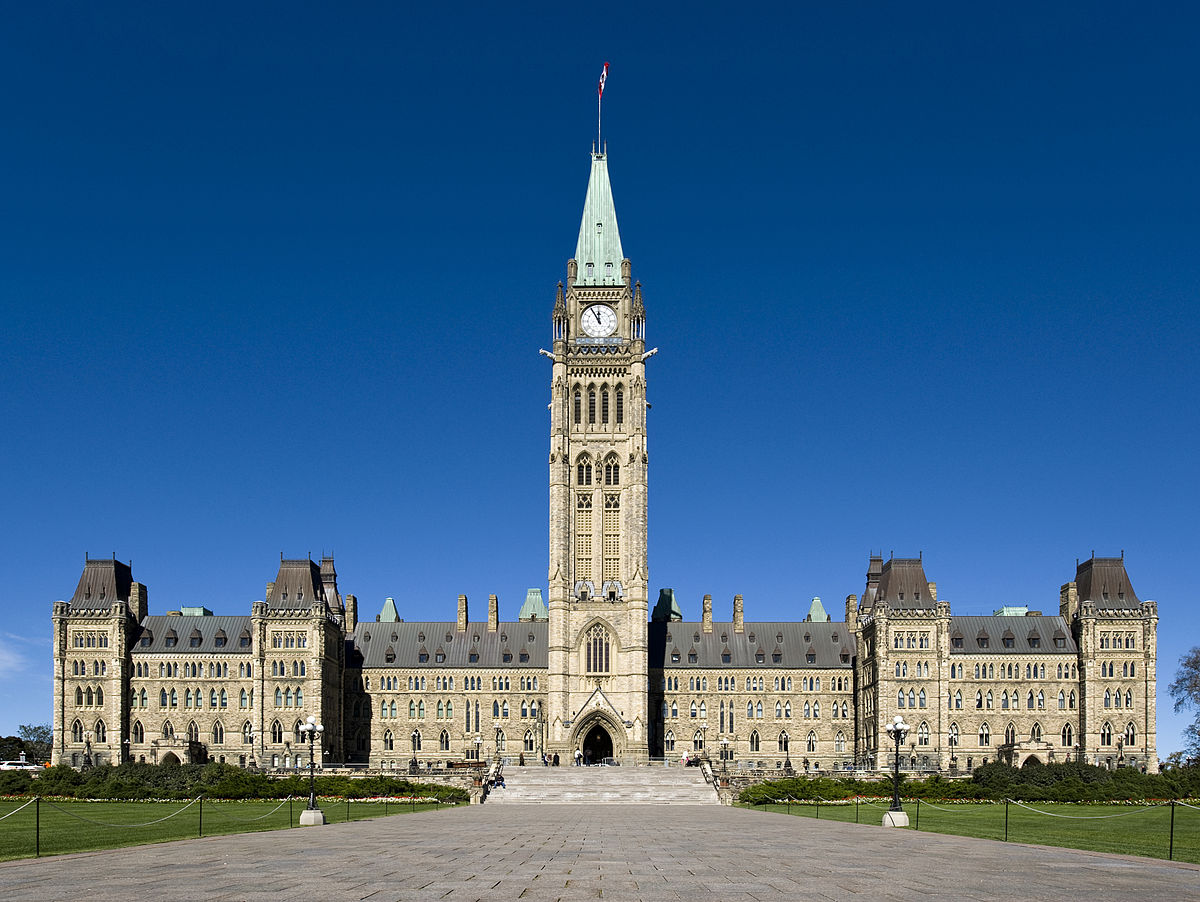
Emergencies Act - Wikipedia
Part II of the Emergencies Act describes "public order emergency" results from serious threats to the security of Canada. When defining "threats to the security of Canada", the act references the definition provided in the Canadian Security Intelligence Service Act, which includes espionage, sabotage, detrimental foreign influences, activities which support the threat or use of violence for a political, religious or ideological objective; or those activities which threaten to undermine or otherwise destroy, or overthrow the Government of Canada.The Canadian Security Intelligence Service Act notes that "lawful advocacy, protest or dissent" do not constitute "threats to the security of Canada".
I’m seeing nothing about phone calls from the American President…but the link is above in case I’m missing it somewhere…
The inquiry is required by law as a result of Prime Minister Justin Trudeau’s decision to invoke the never-before-used Emergencies Act on Feb. 14 to end the protests.
Powers under the act were used to freeze the bank accounts, ban travel to protest sites and compel trucks to tow vehicles blocking streets. The commission must determine whether the Liberal government was justified in using those measures.
During her testimony Thursday, Freeland told the commission the pace of the cross-border interactions during the crisis was uncharacteristically swift. Meetings that typically required advance notice and effort to arrange took place within 24 hours.
In an email to staff, Freeland noted Deese had requested daily updates — a stark signal that a “hard to get hold of” White House adviser was following closely.
Those check-ins never transpired. Four days after the Deese call and three days after Trudeau touched base with Biden, the government invoked the Emergencies Act.

The impact of the emergency powers on border blockades remains unclear (?) Documents tabled at the inquiry show that law enforcement agencies didn't require the Emergencies Act to open up the border.
RCMP Commissioner Brenda Lucki told reporters after her testimony that the force used "existing tools" to carry out arrests near an Alberta crossing on Feb. 14 — the same day as the invocation. The protesters in Coutts, Alta., departed the area the next day.
Emails from government officials in Manitoba claimed a border blockade in that province was cleared without the need for emergency powers.
And a six-day blockade at the busiest Canada-U.S. border crossing between Detroit and Windsor was cleared on Feb. 13, a day before invocation. So someone didn’t send America a memo or something …& thus the Emergencies Act was still imposed on the 14th anyway? Or was Biden et al concerned about the parking situation in Ottawa in the general vicinity of Canadian Parliament? I mean, it could happen, right?
Then…tomorrow is Friday & the LAST day of the Emergencies Act Inquiry…where PM Trudeau testifies…leaving little to no time for cross examination…
The culmination of the testimony to date comes as the prime minister, who announced the decision to invoke the Emergencies Act on Feb. 14, will face questions about his decision on Friday.
Once protesters arrived in large numbers, Trudeau and his family were ultimately moved to an undisclosed location (Bat-Cave…Shhhh…just quietly imagine his costume) for security reasons.
In a display of arrogance surprising even for the arrogant Trudeau government, it has refused to provide the public inquiry into its use of the Emergencies Act with the legal opinion it relied upon to invoke the legislation in order to break up the Freedom Convoy protest.
That was a brief prepared by the federal justice department — referred to by CSIS director David Vigneault in his testimony — which Prime Minster Justin Trudeau and his cabinet used to justify invoking the EA.
This even though the convoy protest wasn’t a threat to national security, according to the EA’s wording.
Without that threat, the government wasn’t supposed to invoke the EA, as it did for the first time since the law was passed in 1988.
Justice Paul Rouleau, presiding over the inquiry, asked Attorney General David Lametti, who refused to answer questions about the legal brief, how the inquiry could determine the reasonableness of what the government did without knowing the information it acted on?
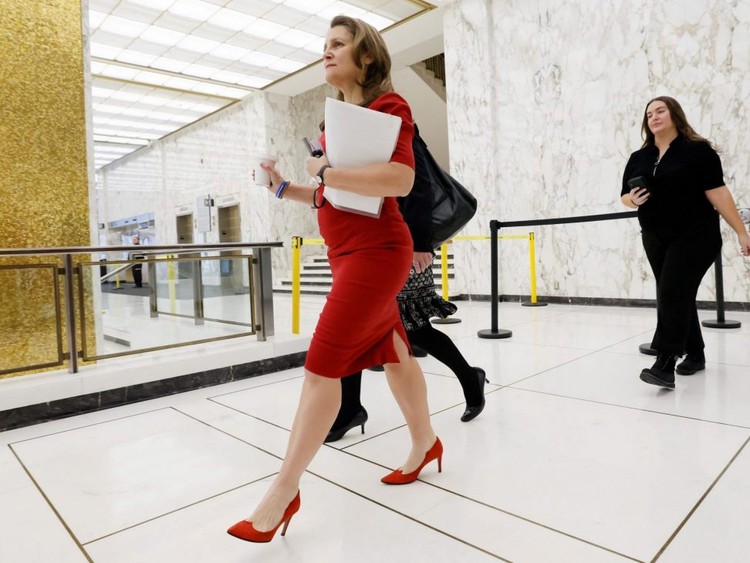
 apple.news
apple.news
Rouleau said he still doesn’t know what Trudeau and his cabinet members were thinking when they invoked the EA, “and I guess the answer is, we just assume they acted in good faith in application of whatever they were told. Is that sort of what you’re saying,” Rouleau asked Lametti, who responded, “I think that’s fair.” (?)
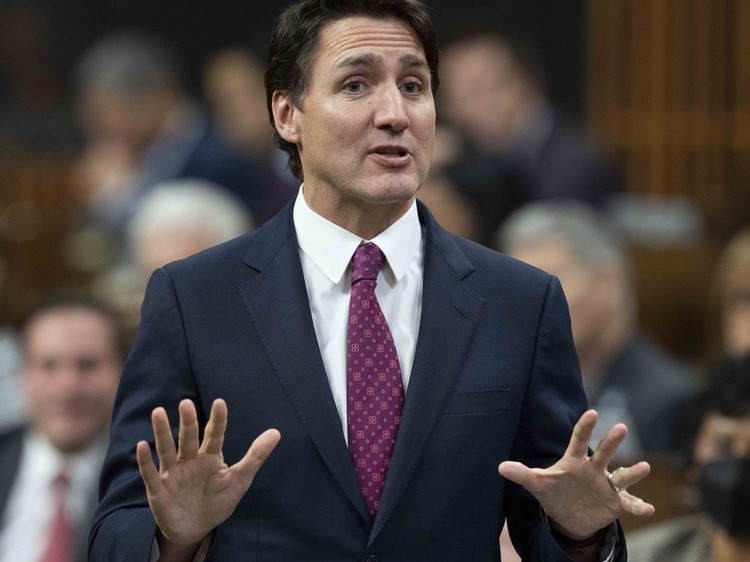
 apple.news
“Yeah, that’s the ticket!! Just(-in) trust us ‘cuz Daddy knows best!!” (???)
apple.news
“Yeah, that’s the ticket!! Just(-in) trust us ‘cuz Daddy knows best!!” (???)
Commission counsel asked if they were correct in understanding Vigneault’s line of thinking at the time, that “if you take a broader definition and then look more broadly, you come up with the advice you gave to the prime minister of your belief that it was required to invoke the act.”
Vigneault added, “Yes, that’s exactly it.”
Indeed, the government’s use of solicitor-client privilege in this context — as if it was on trial and needed to be able to speak to its lawyer in confidence and vice-versa — is absurd.
The inquiry isn’t a trial. No one is going to be charged or convicted of anything and the Trudeau government was essentially giving legal advice to itself.
Which raises the question of what’s in that advice it doesn’t want Canadians to see?

 apple.news
apple.news
Trudeau will likely be pressed about this recommendation, as well as any others he might have received, such as from his national security advisor Jody Thomas, that led him to invoke the act.
There are FOUR possible scenarios that meet the definition of “threats to the security of Canada” under the act.
“Lawful” protests don’t qualify, and neither do phone calls (regardless how timely) from Joe Biden.
1) Espionage or sabotage against Canada or detrimental to the country’s interests
2) Foreign influenced activities, in or related to Canada, that are detrimental to the country’s interest, are clandestine or deceptive, or threaten people
3) Activities in or related to Canada that threaten, direct or use acts of serious violence against people or property to achieve a political, ideological or religious objective in Canada or a foreign state
4) Activities directed toward undermining by covert unlawful acts, or directed toward or intended ultimately to lead to the destruction or overthrow by violence of, the constitutionally established system of government in Canada.
The culmination of the testimony to date comes as the prime minister, who announced the decision to invoke the Emergencies Act on Feb. 14, will face questions about his decision on Friday.
Once protesters arrived in large numbers, Trudeau and his family were ultimately moved to an undisclosed location (Bat-Cave…Shhhh…just quietly imagine his costume) for security reasons.
In a display of arrogance surprising even for the arrogant Trudeau government, it has refused to provide the public inquiry into its use of the Emergencies Act with the legal opinion it relied upon to invoke the legislation in order to break up the Freedom Convoy protest.
That was a brief prepared by the federal justice department — referred to by CSIS director David Vigneault in his testimony — which Prime Minster Justin Trudeau and his cabinet used to justify invoking the EA.
This even though the convoy protest wasn’t a threat to national security, according to the EA’s wording.
Without that threat, the government wasn’t supposed to invoke the EA, as it did for the first time since the law was passed in 1988.
Justice Paul Rouleau, presiding over the inquiry, asked Attorney General David Lametti, who refused to answer questions about the legal brief, how the inquiry could determine the reasonableness of what the government did without knowing the information it acted on?
EDITORIAL: Liberals on invoking EA — trust us — Toronto Sun
In a display of arrogance surprising even for the arrogant Trudeau government, it has refused to provide the public inquiry into its use of the Emergencies Act with the legal opinion it relied upon to invoke the legislation in order to break up the Freedom Convoy protest. That was a brief...
Rouleau said he still doesn’t know what Trudeau and his cabinet members were thinking when they invoked the EA, “and I guess the answer is, we just assume they acted in good faith in application of whatever they were told. Is that sort of what you’re saying,” Rouleau asked Lametti, who responded, “I think that’s fair.” (?)
LILLEY UNLEASHED: Trudeau's secret reasons for invoking the Emergencies Act — Toronto Sun
WATCH BELOW as Sun’s political columnist Brian Lilley says Justice Paul Rouleau doesn’t have the legal reason the Liberals invoked the Emergencies Act just the government’s attitude of just trust us. What do YOU think? Tweet and Facebook us!
Commission counsel asked if they were correct in understanding Vigneault’s line of thinking at the time, that “if you take a broader definition and then look more broadly, you come up with the advice you gave to the prime minister of your belief that it was required to invoke the act.”
Vigneault added, “Yes, that’s exactly it.”
Indeed, the government’s use of solicitor-client privilege in this context — as if it was on trial and needed to be able to speak to its lawyer in confidence and vice-versa — is absurd.
The inquiry isn’t a trial. No one is going to be charged or convicted of anything and the Trudeau government was essentially giving legal advice to itself.
Which raises the question of what’s in that advice it doesn’t want Canadians to see?
LILLEY UNLEASHED: Trudeau's secret reasons for invoking the Emergencies Act — Toronto Sun
WATCH BELOW as Sun’s political columnist Brian Lilley says Justice Paul Rouleau doesn’t have the legal reason the Liberals invoked the Emergencies Act just the government’s attitude of just trust us. What do YOU think? Tweet and Facebook us!
Trudeau will likely be pressed about this recommendation, as well as any others he might have received, such as from his national security advisor Jody Thomas, that led him to invoke the act.
There are FOUR possible scenarios that meet the definition of “threats to the security of Canada” under the act.
“Lawful” protests don’t qualify, and neither do phone calls (regardless how timely) from Joe Biden.
1) Espionage or sabotage against Canada or detrimental to the country’s interests
2) Foreign influenced activities, in or related to Canada, that are detrimental to the country’s interest, are clandestine or deceptive, or threaten people
3) Activities in or related to Canada that threaten, direct or use acts of serious violence against people or property to achieve a political, ideological or religious objective in Canada or a foreign state
4) Activities directed toward undermining by covert unlawful acts, or directed toward or intended ultimately to lead to the destruction or overthrow by violence of, the constitutionally established system of government in Canada.
And go where? The US under biden and the likes of AOC? Europe perhaps, which is SO much better and where there's no left wing influence? China?Fuck this shit. Im getting the hell out of this country.
The only option is to stand up where you are and do what you can to get a CPC gov't elected and hold them to it. Donations, get others to volunteer, do what you can. That's how democracy works.